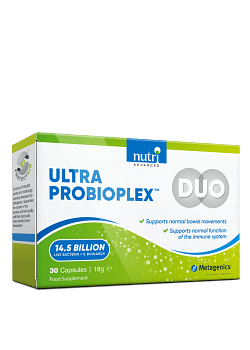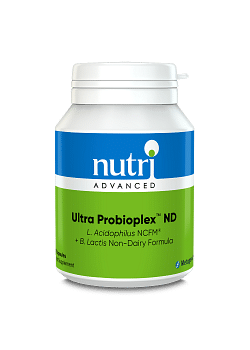The 5 Probiotic Strains You Need To Know
Why you can trust Nutri Advanced Every article on our site is researched thoroughly by our team of highly qualified nutritionists. Find out more about our editorial process.
Research into the gut microbiome has exploded in recent years, and so too has the number of probiotic supplements available online, in health food shops and even supermarkets too.
Choosing a probiotic supplement has therefore become a bit of a minefield! With such a crowded marketplace, it’s almost impossible to choose. And when faced with such extensive choice, many people will make their decision based on price. For some, the cheapest will win, others feel safer opting for a middle of the road priced product, and for some, an expensive price tag adds an extra level of reassurance.
Unfortunately, none of these are an effective way to select a probiotic supplement, here's why...
Probiotics are classified according to:
1. Genus (e.g. Lactobacillus)
2. Species (e.g. Acidophilus)
3. Strain (e.g. NCFM®)
Scientific research into the benefits of probiotic supplementation is carried out on specific strains. For example, Lactobacillus acidophilus NCFM® is the best studied probiotic strain in the world and has over 60 clinical studies demonstrating its extensive health benefits.
The most extensively researched strains include:
• Lactobacillus acidophilus NCFM®
• Lactobacillus paracasei lpc-37
• Bifidobacterium lactis Bi-07
• Bifidobacterium lactis Bi-04
• Saccharomyces boulardii
The single, most important piece of advice you need to follow when choosing a probiotic supplement is to check the label and only select a product that contains specific strains that have been extensively researched, such as those listed above. This is the only way to ensure that the product you buy has the potential to deliver significant health benefits.
This website and its content is copyright of Nutri Advanced ©. All rights reserved. See our terms & conditions for more detail.
Nutri Advanced has a thorough research process and for any references included, each source is scrutinised beforehand. We aim to use the highest value source where possible, referencing peer-reviewed journals and official guidelines in the first instance before alternatives. You can learn more about how we ensure our content is accurate at time of publication on our editorial policy.
Most Popular Articles
-
7 Surprising Ways To Support Your Magnesium
If you are displaying signs of a magnesium deficiency, here are 7 ways to boost your magnesium levels that are easy to incorporate into your daily life. -
5 Best Vitamin C Supplements Picked By Our Experts
Learn more about the different types of vitamin C, the different benefits you get from different types, and what you get for spending more on a good supplement. -
Top 5 Vitamins For Energy And Tiredness Picked By Our Experts
The 5 best and most important vitamins for energy & tiredness including B vitamin food sources & best supplement forms for energy. -
Benefits of Myo-Inositol for Polycystic Ovary Syndrome (PCOS)
In this research review article, we take a closer look at a lesser-known natural compound called myo-inositol that has been found to have significant potential to improve many of the prevalent features of PCOS. -
Top 10 Reasons to Give Your Kids Omega-3
Read the top 10 reasons that kids should have plenty of Omega-3- an essential fatty acid- including for depression, brain function, sleep & reading/maths skills.

















